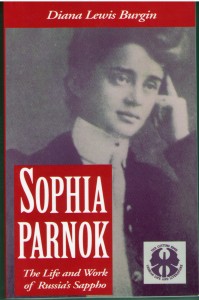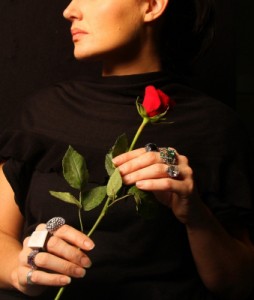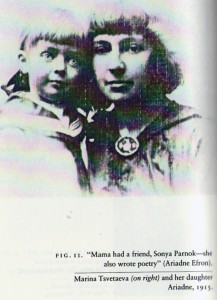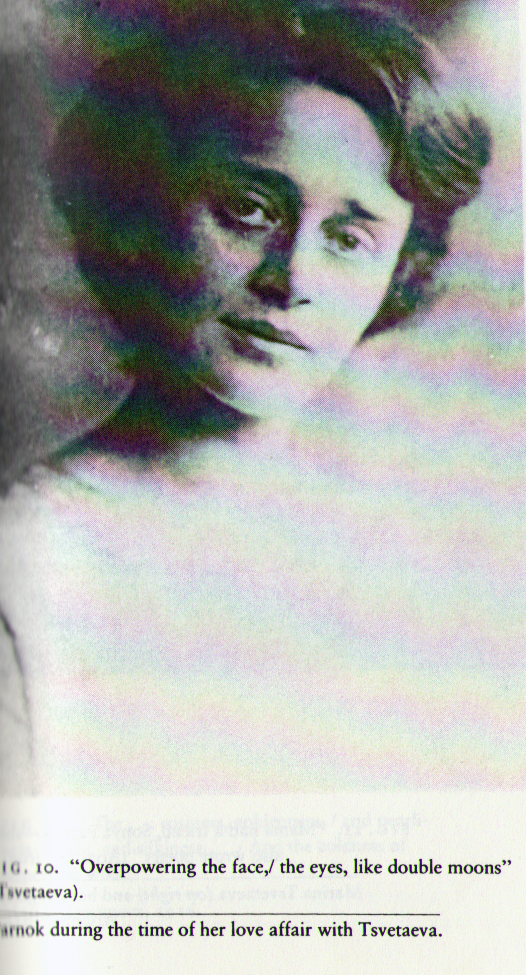 In the minds and hearts of most Russians, including memoirists of either sex, male geniuses in interest and importance; male excellence, strength, and even mediocrity consistently are preferred to female excellence and strength.
In the minds and hearts of most Russians, including memoirists of either sex, male geniuses in interest and importance; male excellence, strength, and even mediocrity consistently are preferred to female excellence and strength.
On December 6, 1895, the great writer Anton Chekhov, whose stories have gained him a reputation the world over for humane attitudes, wrote to his friend, the publisher Suvorin: “The weather in Moscow is good, there’s no cholera, there’s also no lesbian love…Brrr! remembering those persons of whom you write me makes me nauseous as if I’d eaten a rotten sardine. Moscow doesn’t have them-and that’s marvelous.”
It is therefore not surprising, that the best-known period of Parnok’s life is the eighteen months of her love affair with Marina Tsvetaeva, who is justifiably considered one of the four greatest twentieth-century Russian poets. But Sophia Parnok was also a poet. This is the book about her( photo to the left – front cover, to the right a photo from the book-Marina Tsvetaeva with her daughter at the period of time).
From the book; “Tsvetaeva remembered Parnok from the moment she entered the drawing room, wearing a simple, black-knit jacket with a wing collar. A fire was crackling in the grate, the air smelled of tea and White Rose perfume. A lmost immediately, someone came over to Parnok and said there was a young poetwhom she had to meet.. As she rose, she noticed, perhaps for the first time, a young woman with short, curlyblonde hair, dressed in an almost gold-colored faille dress, who was getting up to meet her with an unforced movement.
movement.
Later in the evening, Tsvetaeva remembered clinking glasses with parnok above the blue vase. As they toasted and locked glasses for a moment, she thought to herself,”Oh, be my Orestes!” Spontaneously, she took one of the flowerrs from the vase and offered it to Parnok.
From Tsvetaeva’s “Girlfriend’ dedicated to Parnok:
“and still-
what happened, really?
What do I so regret and want?
And I don’t know: did I conquer?
Was I overcome?”
Sophia Parnok was born in1885 in Taganrog in Russia to Alexandra and Yakov Parnokh, middle class Jewish family, who was considered part of Taganrog intellectual elite. Her mother Alexandra Abramovna was an exceptionally well-educated woman for her time, one of the first generation of women doctors in Russia. Her father Yakov Solomonovich, a pharmacist and the owner of an apothecary, was one of Taganrog’s five hundred “hereditary honorary citizens”, a title conferred on persons not of gentle birth for good citizenship and services rendered to the state. Though sensitive to anti-Semitism, he was indifferent to religion, never attended synagoue, provided no religious instruction for his children, and gave frequent voice to his dream of leaving Russia and living in Werstern Europe. The children got an excellent education at home and in gymnasiums.
Watch our photo show “Sophia Parnok”:
The very book we are looking through, provides us with the detailed analysis of the poems Sophia wrote at different times and as Pasternak put it in words: “The biography of a poet is found in what happens to those who read her”.
Her verses. Unfortunately, I never had a chance to read them in her native language, Russian. Here they are presented in translation to English. Translated beautifully. But where are the originals? Alas, I don’t see them. So, I could not formulate my opinion about them. And appeal again to Tsvetaeva’s “Girlfriend”:
“Parrying all smiles with my poems!
I reveal to you and the world-at-large
Everything in you and that lies in store for us,
Fair stranger with the brow of Beethoven!”
Parnok’s feeling for Tsvetaeva were slower to crystallize and express themselves and are much harder to guess at. She immediately recognized Tsvetaeva’s giftedness, fell in love with it, nurtured and cherished it, and never ceased to love it. The less generous side of her must have envied her young lover’s poetic gift, but she managed somehow to conquer her envy and wisely refrained from vying directly with Tsvetaeva in the poetic arena. She rejected the loathsome role of Salieri and endeavored to be a “Salieri who loved his Mozart” deferring to Tsvetaeva’s desire to write their love into Russian poetry in the “Girlfriend” poems.
“Right away my heart said:”She’s the one!”
At random, I forgave you everything,
Knowing nothing-not even your name!
My only thought was,”love me, love me!”
Sophia Parnok died in 1933 in Karinskoye, village of about forty houses, in the cottage, Parnok and Tsuberbiller rented not far from the Moscow River.
All who knew her remember Sophia Parnok with love and tenderness in their hearts. Bless her!
Listen to: kd Lang “I will Survive”
